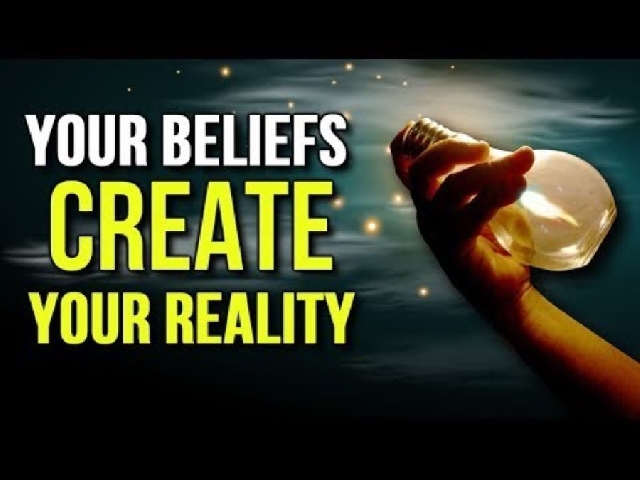How your beliefs can help you or hurt you
 Belief
Belief
“When you let the results define you — your talent, your test scores, your weight, your job, your performance, your appearance — you become the victim of a fixed mindset. But when you dedicate yourself to showing up each day and focusing on the habits that form a better identity, that's when you learn and develop. That's what a growth mindset looks like in the real world.”
This should be the cardinal takeaway from today’s article. The world as it stands now will create a greater divide socioeconomically and in many other ways. During a struggle, it becomes more evident that the field is not level.
Many say COVID-19 has exposed the world as being one collective. Well, with respect to how the coronavirus is no respecter of persons, yes. But in how the pandemic is affecting everybody, that’s a big no. It will be more evident when the gaps within our societies widen after we beat and survive this coronavirus.
In Ghana, Foster shopped for three months’ worth of groceries, I shopped for two, and we discussed just how much a three-month lockdown will have drastic effects on low-income families if they’re not allowed to work for 100 days straight. The stimulus cheques circulated by the US government meant very different things to a California resident and someone living in Tucson, Arizona.
Times are hard and might get harder. This is not the time to accept labels, because many people will. Many people will accept that they’re “just unlucky”. Some will give up and say “this is it, this is our life now” and proceed to justify being marginalised. And you can’t blame them for times are hard.
But to some, to some that understand that success is the destination of a procedure, a long process that isn’t always flattering, to some that realise that their best use for their time is to keep trying, those people will most probably attain their realistic definitions for success.
Enjoy this James Clear article reproduction. I hope it flicks a switch for you as it did for me.
Enjoy! Good morning.
? ---- ? ---- ? ---- ? ---- ? ---- ? ---- ? ---- ? ---- ?
Carol Dweck is a researcher at Stanford University.
Dweck is well–known for her work on “the fixed mindset vs. the growth mindset.” Here's how Dweck describes the difference between these two mindsets and how they impact your performance…
In a fixed mindset, students believe their basic abilities, their intelligence, their talents, are just fixed traits. They have a certain amount and that's that, and then their goal becomes to look smart all the time and never look dumb. In a growth mindset, students understand that their talents and abilities can be developed through effort, good teaching and persistence. They don't necessarily think everyone's the same or anyone can be Einstein, but they believe everyone can get smarter if they work at it.
—Carol Dweck, Stanford University
The benefits of a growth mindset might seem obvious, but most of us are guilty of having a fixed mindset in certain situations. That can be dangerous because a fixed mindset can often prevent important skill development and growth, which could sabotage your health and happiness down the line.
For example, if you say, “I'm not a math person” then that belief acts as an easy excuse to avoid practicing math. The fixed mindset prevents you from failing in the short–run, but in the long–run it hinders your ability to learn, grow, and develop new skills.
Meanwhile, someone with a growth mindset would be willing to try math problems even if they failed at first. They see failure and setbacks as an indication that they should continue developing their skills rather than a signal that indicates, “This is something I'm not good at.”
As a result, people who have a growth mindset are more likely maximise their potential. They tend to learn from criticism rather than ignoring it, to overcome challenges rather than avoiding them, and to find inspiration in the success of others rather than feeling threatened.
Are Your Beliefs Holding You Back?
Dweck's research raises an important question about the connection between what you believe and what you do.
If you believe things about yourself like…
• “It's hard for me to lose weight.”
• “I'm not good with numbers.”
• “I'm not a natural athlete.”
• “I'm not creative.”
• “I'm a procrastinator.”
It's pretty clear that those fixed mindsets will cause you to avoid experiences where you might feel like a failure. As a result, you don't learn as much and it's hard to get better.
What can you do about this? How can you change the things you believe about yourself, eliminate your fixed mindset, and actually achieve your goals?
How Your Actions Change Your Beliefs
In my experience, the only way I know to change the type of person that you believe that you are — to build a new and better identity for yourself — is to do so with small, repeated actions.
Here's an example…
Leah Culver started running one year ago. This is how she describes the process…
I started running a year ago. I didn’t entirely start from scratch. In the past I had jogged every once in a while, maybe once a month.
My first run was just two miles at 12 minutes per mile. That’s pretty slow. However, for a non-athlete I felt fairly good about it. I jogged a couple more times that week. After a couple weeks of regular jogging, I set a goal for myself.
I knew I would never be fast enough to impress anybody so it didn’t make sense to make speed my goal. I could have picked a race to train for, a 5k or half miler, but I knew how those ended. Everyone seems to quit running right after their big race. I wanted to do something different. I wanted to not quit.
My goal involved not going too long between runs. If I skipped more than a couple days, wouldn’t that be quitting? So I started running four and five days a week. The longest I went between runs was three days when I was in Hawaii for vacation.
My goal made all the difference. I was still slow, but I could at least feel good that I was running a lot. I’d have good days where I would run fast and feel great but I also had lots of bad days where I was tired and just didn’t feel like running. In retrospect those days were almost better than the good days because they reinforced my goal — I didn’t quit.
I ran my first 5k on Halloween, nearly five months after I had taken up running as a hobby. I wore a costume — fairy wings — and tried to keep up with a random guy with an owl on his head. I finished in 28 minutes and was super happy. I learned that racing wasn’t always about being the fastest, but doing my personal best.
I signed up to run a full marathon in December, hired a running coach, and set a regular running schedule.
I’ve started to think of myself as a runner.
If you would have told me a year ago that I would be working out almost every day and running 100 miles a month I would never have believed you. Running really snuck up on me. I had modest aspirations and didn’t really care if I was great at running.
I just wanted to stick to my one goal: don’t quit.
Did Leah start by thinking about how much weight she wanted to lose? No. Did she start by thinking about how fast she wanted to run? No. Did she start by thinking about the marathon she wanted to complete? No.
She didn't start by thinking about the results.
She simply focused on the process. She focused on showing up. She focused on sticking to the schedule. She focused on “not quitting.”
Eventually, the results and the self–confidence came anyway. Her actions shifted the way that she saw herself. “I’ve started to think of myself as a runner.”
The best musicians practice every day. The best athletes practice every day. The best writers practice every day. These are people who have a high average speed.
Yes, their results are fantastic and they get to enjoy the fruits of their labour … but it's not the results that set them apart, it's the dedication to daily practice. It's the fact that their identity is centred on being the type of person who does their craft each day.
This is the process of identity-based habits that I've written about before. People with a growth mindset focus on the process of building a better identity rather than the product.
Identity-Based Habits vs. Rapid Transformations
So often, we overestimate the importance of a single event (like a marathon) and underestimate the importance of making better choices on a daily basis (like running 5 days per week).
We think that getting “that job” or being featured in “that media outlet” or losing “those 30 pounds” will transform us into the person we want to become. We fall victim to a fixed mindset and think that we are defined by the result.
There are layers to behaviour change. Sustainable and long–lasting change starts with building a better identity, not by focusing on results like your performance or your appearance.
Here's the truth: it's your daily actions that will change what you believe about yourself and the person you become. It's about setting a schedule, showing up, and sticking to it. It's about focusing on building the right identity rather than worrying about getting the right result.
In my experience, identity-based habits tie in directly with the research from Dweck and her contemporaries. When you let the results define you — your talent, your test scores, your weight, your job, your performance, your appearance — you become the victim of a fixed mindset. But when you dedicate yourself to showing up each day and focusing on the habits that form a better identity, that's when you learn and develop. That's what a growth mindset looks like in the real world.
What You Should Do Now
In case I haven't made it clear enough already: skill is something you can cultivate, not merely something you're born with.
You can become more creative, more intelligent, more athletic, more artistic, and more successful by focusing on the process, not the outcome.
Instead of worrying about winning the championship, commit to the process of training like a champion. Instead of worrying about writing a bestselling book, commit to the process of publishing your ideas on a consistent basis. Instead of worrying about getting six pack abs, commit to the process of eating healthy each day.
It's not about the result, it's about building the identity of the type of person who gets to enjoy those results.
______________________________________
This whole piece has been a close-to-verbatim reproduction of a James Clear writ on similar topic I read this week. I have decided to reproduce one of his clever pieces every few months, clearly citing him as source and author with a closing paragraph like this one.
? ---- ? ---- ? ---- ? ---- ? ---- ? ---- ? ---- ? ---- ?
Hit me up on social media and let’s keep the conversation going! I read all the feedback you send me on LinkedIn, Twitter, Instagram and Facebook.
Go to bit.ly/maxwrites to read all my previous articles.
Also, feel free to send me your articles on relevant topics for publication on the Macroeconomic Bulletin. I’d give you full credit, an intro, and an outro. Kindly make it about 1000 words.
Have a lovely week!
? ---- ? ---- ? ---- ? ---- ? ---- ? ---- ? ---- ? ---- ?
Maxwell Ampong is the CEO of Maxwell Investments Group, a Trading and Business Solutions provider. He is also the Business Advisor for the General Agricultural Workers’ Union of TUC (Gh). He writes about trending and relevant economic topics, and general perspective pieces.
Source: classfmonline.com/Maxwell Oppong
Trending News

Gov't plans to revise traditional customs following controversial Gborbu marriage
08:30
Jobs: we'll hold gov't accountable - Graduate unemployed nurses
10:22
Surrender Ghana to the Lord – Alan to Akufo-Addo gov't
13:42
Labour threatens strike over unpaid pensions
08:18
NDC Gadangme Caucus condemns shooting incident at Kplejoo festival in Tema Newtown
10:07
Economist adopts 13 constituencies to bolster NDC's chances in 2024
13:29
Police arrests trucker for Tema-Mpakadan rail accident
08:12
It's a fallacy that the amount of any fertiliser used equates yield – COCOBOD’s RM&E Dir. pooh-poohs prosecution's attempt to downplay Lithovit's efficacy
11:29
'It's disrespectful!' – Asogli State tackles gov't's 'no-consultation' move to rename Ho Tech. Uni. after Ephraim Amu
13:23
Naa Okromo not pregnant – Gender minister-designate says she'll be reunited with her parents
20:33



